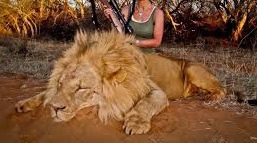
Up until 2010, hunters in the USA could bring back parts of the lions that they hunted to the USA. Under Obama the import of body parts from African hunts was banned because of their inability to get control of the poaching was going on.
However from the second that Trump came to power, despite giving a message on most things, he has been careful to promote hunting. If you wish to import body parts at the moment, you have to apply for a licence on each occasion.
Now I have written in the past about lion hunting in Tanzania; there are huge tracts of land which are only protected because of hunting, and when it is done under government control this hunting is done at a fully sustainable level. One example is the Selous, a 50,000 square mile hunting reserve (minus a 2,500 square mile photographic safari block), where they kill around 50 lions a year or 1% of the population. Now as I said before the impact of this hunting is likely to be higher than the 1% level, as killing of the pride male (hunters generally want an impressive mane), generally leads to to the new male killing all the young cubs and it is not unusual for females to die protecting their young. As such the killing of an adult male can lead to the death of another five or more lions. Some could argue that a 5% harvest rate is also sustainable, and this may be true but it is not what the numbers are worked out on the basis of.
Obama’s move to ban the import of hunt body parts however was on the basis largely of the problems with the elephant massacre that was going on. This arguably has not been got under control, generally the easy targets for elephant poaching that have lost the majority of their elephants (large reserves that are unfenced, meaning not only is it easy for poachers to get in, but the bodies of the animals they kill might not be found for years), so it is harder to track where the ivory is now coming from. Making money from hunting as a country should be a reward for looking after your wildlife, and while Tanzania has made great progress it is nowhere near eradicating this scourge. Countries in the West should be encouraging activities that support the Natural World for the long-term.
I do reluctantly agree that that in places such as the Selous, where there are disease reservoirs (the area was originally emptied of human settlements because the tsetse fly carries sleeping sickness), however I feel that this money should be a reward for good management, and whether the management of the Selous has made progress or not, they certainly haven’t yet done enough justify this type of income.
More to the point, while we don’t know the intricacies of the debate about whether they should be allowed, it appears to follow similar decisions made since Trump became president – if Obama did it we must do the opposite. I feel that the American government’s rationale should be more thought through than this.
